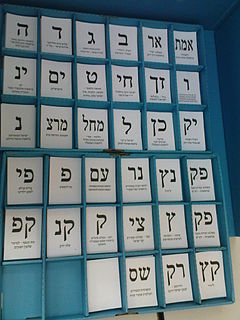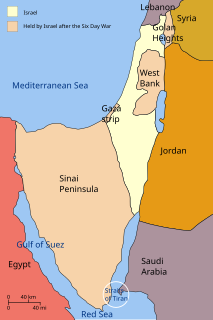
The Prime Minister of Israel is the head of government and chief executive of Israel.
Mapai was a centre-left political party in Israel, and was the dominant force in Israeli politics until its merger into the modern-day Israeli Labor Party in 1968. During Mapai's time in office, a wide range of progressive reforms were carried out, as characterised by the establishment of a welfare state, providing minimum income, security, and free access to housing subsidies and health and social services.
Rafi was a center-left political party in Israel, founded by former Prime Minister, David Ben-Gurion in 1965. In 1968 it was one of three parties that merged to form the Israeli Labor Party.

The General Zionists were a centre-right Zionist movement and a political party in Israel. The General Zionists supported the leadership of Chaim Weizmann and their views were largely colored by central European culture. Their political arm is an ancestor of the modern-day Likud.
Gahal was the major right-wing political alliance in Israel led by Menachem Begin from its founding in 1965 until the establishment of Likud in 1973.
The Democratic Movement for Change, commonly known by its Hebrew acronym Dash was a short-lived and initially highly successful centrist political party in Israel. Formed in 1976 by numerous well-known non-politicians, following a spectacular breakup, it had ceased to exist within less than two years.
The Progressive Party was a political party in Israel.
Poalei Agudat Yisrael was a trade union and Jewish political party in Poland, and was a minor political party in Israel. It was also known as PAI or PAGI, its Hebrew acronym.
Elections for the fifth Knesset were held in Israel on 15 August 1961. Voter turnout was 81.6%.
Elections for the sixth Knesset were held in Israel on 2 November 1965. Voter turnout was 85.9%.
The Independent Liberals were a political party in Israel between the 1960s and 1980s.
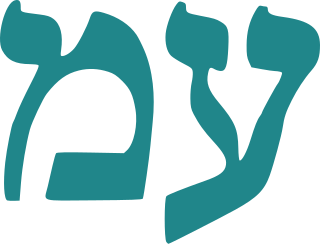
The National List, sometimes translated as the State List, was a political party in Israel. Despite being founded by David Ben-Gurion, one of the fathers of the Israeli left, the party is an ancestor of the modern-day Likud, Israel's largest right-wing bloc.
Legislative elections were held in Israel on 17 May 1977 to elect the ninth Knesset. For the first time in Israeli political history, the right-wing, led by Likud, won a plurality of seats, ending almost 30 years of rule by the left-wing Alignment and its predecessor, Mapai. The dramatic shift in Israeli politics caused by the outcome led to it becoming known as "the revolution", a phrase coined by TV anchor Haim Yavin when he announced the election results live on television with the words "Ladies and gentlemen—a revolution!". The election saw the beginning of a period lasting almost two decades where the left- and right-wing blocs held roughly equal numbers of seats in the Knesset.

The Alignment is the name of two political alliances in Israel. Each of these Alignment parties later merged into what is now the Israeli Labor Party.
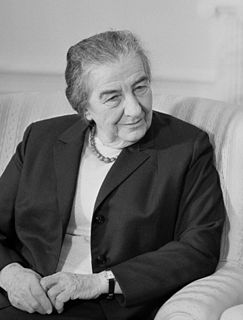
The fifteenth government of Israel was formed by Golda Meir on 15 December 1969 following the October elections. The government was a continuation of the national unity government formed during the previous Knesset, and consisted of the Alignment, Gahal, the National Religious Party, the Independent Liberals and the Israeli Arab parties Progress and Development and Cooperation and Brotherhood. Gahal left the coalition in early August 1970 after the government agreed to accept the Rogers Plan.

The thirteenth government of Israel was formed by Levi Eshkol on 12 January 1966, following the November 1965 elections. His coalition included the Alignment, the National Religious Party, Mapam, the Independent Liberals, Poalei Agudat Yisrael, Progress and Development and Cooperation and Brotherhood, and had eighteen ministers.

The fourteenth government of Israel was formed by Golda Meir on 17 March 1969, following the death of Prime Minister Levi Eshkol on 26 February. She kept the same national unity government coalition, including the newly formed Alignment alliance of the Labor Party and Mapam, as well as Gahal, the National Religious Party, the Independent Liberals, Poalei Agudat Yisrael, Progress and Development, Cooperation and Brotherhood. The only change to the cabinet was the scrapping of the Minister of Information post, with the previous post-holder Yisrael Galili becoming a Minister without Portfolio instead.

The sixteenth government of Israel was formed by Golda Meir on 10 March 1974, following the December 1973 elections. However, following Meir's resignation as Prime Minister on 11 April, it only remained in office until 3 June, and at just 85 days, was the shortest-lived government in Israeli political history.
Politics in Israel is dominated by Zionist parties. They traditionally fall into three camps, the first two being the largest: Labor Zionism, Revisionist Zionism (conservative) and Religious Zionism. There are also several non-Zionist Orthodox religious parties, non-Zionist left-wing groups as well as non-Zionist and anti-Zionist Israeli Arab parties.
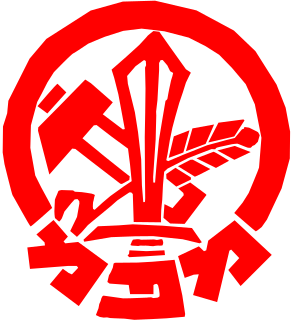
Mapam was a left-wing political party in Israel. The party is one of the ancestors of the modern-day Meretz party.
